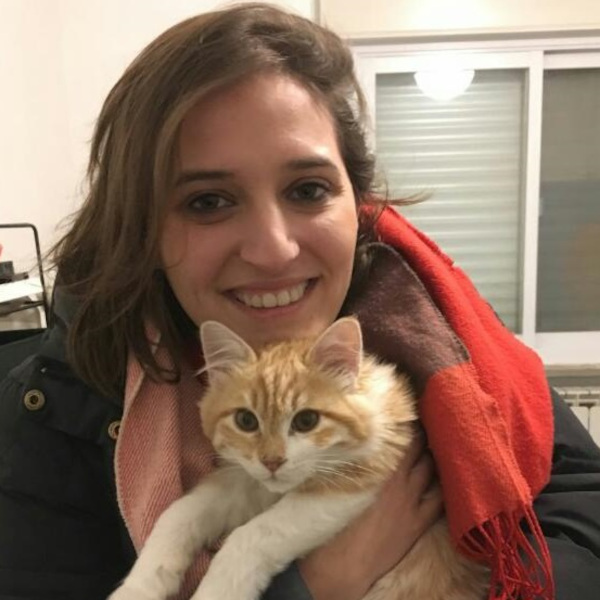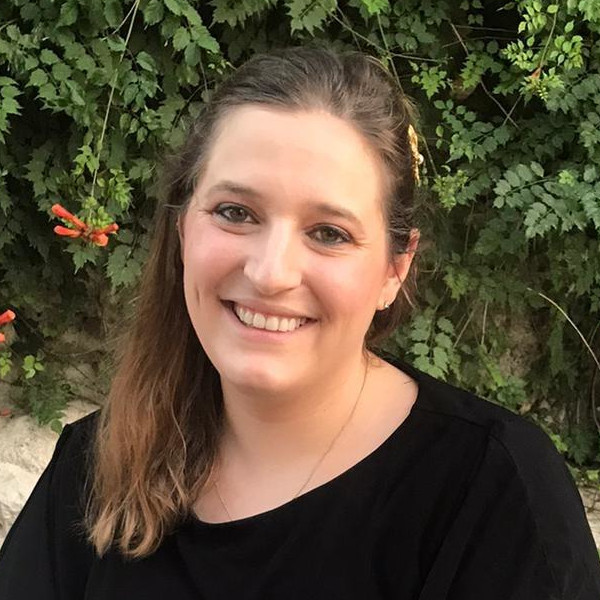Interviews with Olim
Each month, we interview an oleh or olah for our newsletter.
We invite you to read the stories of LGBTQ+ people who have made Israel their home.
"I knew I would make my life here."
Interview date: July 2017.
Updated: August 2022. Scroll down for update.
Q. Where were you born and where did you grow up?
A. I was born and and grew up in Vancouver, Canada, and stayed until I was 18.
Q. At what age did you come out? And how did it go?
A. Coming out was quite a long process for me. I’d say from the time I started asking myself those questions in college, around the age of 19, it took me another eight years to publicly come out. I was 27 and, by that point, I had already built a solid network of supportive family and friends. I even managed to hold on to a few of my religious mentors. For me, the people around me were overwhelmingly accepting. I was definitely my own toughest critic. Because I had become religious in high school, I had a very hard time accepting my queer identity, because it didn’t fit with all I had learned, and the lifestyle that I was taught I should have.
Q. Were you involved at all in the LGBT community back home?
A. I was not involved when I was growing up in Vancouver, and it wasn’t really a conversation that took place when I was in high school (except in a derogatory way). I will say that my high school, King David High School in Vancouver, has come leaps and bounds since I was there, and they now have an LGBT group led by a faculty member in the school.
Q. What is your involvement (if any) in the LGBT community in Israel?
A. Since coming out about a year and a half ago in the community, I’ve gotten really involved. I’m a member of the planning team for Shabbat Shelach, an LBT women’s group that meets for Shabbat meals once a month in Jerusalem. We also organize the Women’s Gathering events in Jerusalem, and recently kicked off a lecture series called Queer Questions, which examines different LGBT issues. Often, these are related to lifecycle events, as well as examining issues through a religious lens. We have had lectures on legal issues related to same-sex marriage and children, as well as a lecture on female sexuality and lesbian relationships. We look forward to planning more lectures in this series, such as “Holiness in Same-Sex Relationships”, marriage ceremonies and other issues of religious practice.
Q. How long since you made Aliyah?
A. I made aliyah in October 2013, so just over three-and-a-half years ago.
Q. Did you move here on your own or with family/friends/significant other?
A. I moved here on my own.
Q. Why did you make Aliyah?
A. I was raised on stories of my mum spending time in Israel as a teen and young adult at Kibbutz Ulpan and as a volunteer, and Zionism was always a part of my education in school. I came on my first trip to Israel as a 15-year-old with my high school class, and from that point I knew I would make my life here. I made twelve trips to Israel in the ten years between my first trip and my aliyah. It’s the Jewish homeland.
Q. How is it going so far?
A. I’ve been very blessed to have had a pretty smooth aliyah process. In the three-and-a-half years that I’ve been here, I’ve built a new career, a supportive community of friends (both queer and straight!), and have found my partner – and not to be stereotypical or anything, but we have a cat. I won’t say that it’s all been smooth; everyone has their ups and downs. But overall, I’d say it’s going pretty well.
Q. What do you do in terms of work?
A. I work in marketing for an international company. We work to help Israeli companies tell their stories to international markets. We work with technology companies, health and health-tech companies, renewable energy, telecom, and others. It’s a great, diverse, and challenging field.
Q. How is your Ivrit?
A. It’s decent in terms of my understanding. I get by speaking to my landlord, paying my bills. I’m definitely not fluent. I plan to start going to Qulpan in Jerusalem.
Q. What has been your biggest challenge so far?
A. I think most of my challenges have been the personal ones. Trying to balance my queer identity with my religious identity has been particularly challenging, as I don’t want to give up either. That’s a much longer conversation, not suitable for a short Q&A.
Q. How do you perceive the Israeli LGBT community?
A. Hard to say about the whole Israeli LGBT community. I know my community that I’ve helped to build in Jerusalem. There is a real burgeoning English speaking, religiously-connected community in Jerusalem. When I say religiously-connected, that doesn’t just mean Orthodox. I mean people whose Jewish identity is equally as important to them – they feel connected to their Jewishness, to this country and the Jewish people. The next challenge is helping to integrate the English-speaking community we have been building, with the larger Israeli-LGBT community.
Q. How is being LGBT in Israel different to back home?
A. Well, back home is relative. In Vancouver, I was not aware of my sexuality, and when I lived in New York for just over five years, I was battling with myself over my sexual identity. I would say that moving to Israel really allowed me to come into my own, accept myself for all parts of me – and it’s an ongoing process.
Q. If you were making aliyah now, would you do anything differently?
A. Not too much. Maybe try to save and invest a bit more money before coming over here.
Nicole

Our Newsletter
Sign up if you would like to receive a monthly email listing events of interest to LGBT English-speakers in Israel, an interview with an oleh/olah and other useful information.
Want to be interviewed?
Complete the form below and we will get back to you.
"The biggest, most profound change I’ve ever experienced in my life"
Interview date: August 2022
Q. Has your life changed since we last interviewed you? If so, how?
A. Yes, dramatically. I met my now wife in 2016. We dated for about a year and change before getting engaged. We got married in 2018, first in the U.S. legally and later had our Jewish ceremony in Israel. Fortunately, the process to register our marriage license was smooth in the Jerusalem Misrad Hapnim. The other major change – we welcomed our daughter to the world in 2021. That has been the biggest, most profound change I’ve ever experienced in my life, and we are exhausted in the best way possible.
Q. Are you still living in the same town/city to which you made aliyah? Or have you moved around?
A. We still live in Jerusalem, though in a bigger space than the one-bedroom apartment we had during Covid lockdowns. However, we’ll be moving to Modiin next year, and would love to connect with other LGBT olim there!
Q. Are you working in your desired industry/area? Do you have any advice on job hunting, job applications and interviews?
A. Yes, in fact, I’ve been with my company, a global communications agency, going on nine years. It’s a difficult job market right now because of the economic realities we are dealing with. I’d say, keep an open mind to positions you may not have thought of, and don’t be afraid to pivot your career. If you’ve got an open mind and are willing to learn, you can find new opportunities here!
Interviewing advice – do your homework. I’m always most impressed with candidates who come in and clearly have done their research on my company, our clients, and the communications industry in general. This can definitely help you stand out. Oh, and send follow up thank you emails to your interviewers.
Q. How is your Ivrit now? What sites or apps would you recommend that helped you?
A. My Ivrit is “yom yomi” as they say. I’m still most comfortable in English, though I can follow conversations, deal with bureaucracy, pay bills, and generally navigate my life here. Speaking still remains a challenge, and it’s a frustration of mine that my speaking vocabulary is so much more limited than my understanding when reading or being spoken to. I use Google Translate a lot.
Q. Have you discovered any off-the-beaten-track locations that you’d recommend to others?
A. My wife and I just had a really nice weekend away at a tzimmer at the Metler Winery in Agur. It is not a kosher winery, but the location was absolutely beautiful, with the tzimmer overlooking the vineyard.
Q. Are there any other groups or activities that you found that helped you integrate more into Israeli society?
A. I’m still very active in Shabbat Shelach, helping to build community for queer women and women-aligned folks here. We are most active in Jerusalem, but have members come in from Tel Aviv, Haifa, Be’er Sheva, and other places. Though this isn’t “Israeli” society in the sense of being native Israeli, we have our growing community that is a really important source for support, friendship, community… and even love!
Q. Do you feel that living in Israel has changed you? If so, how?
A. I’ve now lived most of my adult life in Israel. I’d say it’s made me more direct in my communication (to put it lightly). Especially in business, there is no BS in how we communicate. We tell our clients our opinions, and they share theirs equally freely. I prefer it this way, and it’s highlighted for me when speaking with colleagues in the U.S. how much more direct our communication is in Israel. We are passionate people, who care a lot, for better or for worse.
Q. Do you have any practical advice for new olim/olot or anyone who’s considering making aliyah?
A. Practical advice – similar to my career advice – have an open mind to new types of jobs. I encourage people to explore ways of connecting with the innovation eco-system. A few areas that I find most interesting are the health tech, climate tech and food tech industries – there’s great opportunity to build careers in these fields.
Also, don’t rely on others to provide you with community – be proactive to build it for yourself – that’s what we’ve done with Shabbat Shelach, and I’d say many of my closest friends now have come from that community.
Nicole

Our Newsletter
Sign up if you would like to receive a monthly email listing events of interest to LGBT English-speakers in Israel, an interview with an oleh/olah and other useful information.
Want to be interviewed?
Complete the form below and we will get back to you.


